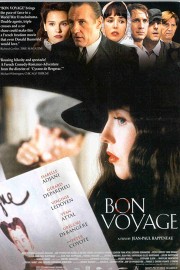Bon Voyage
The French have a curious way of moviemaking. You see, drama and comedy, high brow and low brow, always seem intertwined in some way. Not always, and unfortunately, I’m not so well versed in French cinema as I should be, but you watch movies like “Grand Illusion,” “The 400 Blows,” and “Alphaville,” and there’s a lot of moving between genres and styles rather effortlessly.
The 2003 film, “Bon Voyage,” is a wonderful example of this. Though the film is set at the time of the German occupation of France during WWII, the story of an ensemble of individuals– from actresses to government officials, from professors to escaped convicts –switches between drama, comedy, and even a little bit of mystery as the main characters all try and leave the country. It’s a sly bit of escapism.
The film begins at, well, a movie premiere. We never see the film onscreen, but we see several sets of eyes of the film’s star (Isabelle Adjani) as the audience watches the screen. The lights come on, and the star, Viviane, is greeted by a French cabinet minister, Jean-Étienne Beaufort (Gérard Depardieu), who is quite taken by her, and appreciates the escapism she offers during dark times. The other set of eyes we see watching Viviane from the crowd belongs to André Arpel (Nicolas Pignon), a former lover. He has his own agenda as he follows Viviane home from the premiere, and barges into her apartment. We then meet a writer friend of Viviane’s, Frédéric Auger (Grégori Derangère), who gets a frantic call from the star. When he arrives, Arpel is dead, a seeming accident. The pair move the body into the dead man’s car, and Auger drives off, although the rain forces him into an accident, and lands him in jail when the body is discovered. Cut to June of 1940: the Germans are moving into France; Viviane has become involved with the cabinet minister; and as the police are evacuating prisoners, Frederic escapes, and soon finds himself reunited with Viviane in Bordeaux, which brings up old feelings, and new surprises.
There’s a lot of “Casablanca” in “Bon Voyage”: the race to escape Nazi occupation; the love triangle; the double-crosses from seeming friends; and the “love trumps all” sense of victory at the end. The film feels like an old-school Hollywood production (right down to the uniformly excellent cast), but is very French in its approach to formula. There are story elements of mystery, which are enhanced by the great score by Gabriel Yared (“The English Patient,” “The Talented Mr. Ripley”); there are moments of subtle comedy, as well as out-and-out farce; and there’s a ravishing sense of romance that pervades throughout the whole film. This is a truly wonderful surprise for a film I got, sight unseen, as a Christmas present from a friend a couple of years ago.










